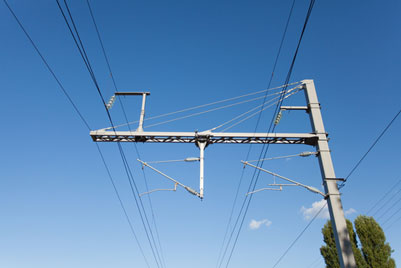Electrifying the railway across Britain moves a step closer
Posted: 4 February 2014 | | 2 comments
Network Rail have appointed four suppliers to deliver a £2 billion programme to electrify more than 2,000 miles of Britain’s railway over the next seven years, providing faster, quieter, greener and more reliable journeys for passengers and freight users and cutting the cost of the railway…


Network Rail have appointed four suppliers to deliver a £2 billion programme to electrify more than 2,000 miles of Britain’s railway over the next seven years, providing faster, quieter, greener and more reliable journeys for passengers and freight users and cutting the cost of the railway.


(Copyright: JP Chretien) Network Rail have appointed four suppliers to deliver a £2 billion programme to electrify more than 2,000 miles of Britain’s railway
Once electrification schemes including the Great Western and Midland main lines, Liverpool to Manchester and Preston, the Valley lines in south Wales and the ‘electric spine’ from Southampton docks to the West Midlands and Yorkshire are complete, more than half of Britain’s rail network will be electrified with electric trains accounting for three-quarters of all traffic.
“Our work to electrify 2,000 track-miles represents the biggest programme of rail electrification in a generation,” says Simon Kirby, Managing Director of Infrastructure Projects at Network Rail. “Thanks to a firm commitment from government to invest in electrification schemes across the country, we are transforming the railway and providing Britain with a sustainable, world-class transport system that is fit for the future. To deliver this work in the safest and most efficient way possible, we need to make the most of the huge potential within our supply chain.”
Why an electrified railway?
Electric trains are not only better for the environment (emitting on average, 20% to 30% fewer CO2 emissions than diesel) but are quieter and smoother for passengers while causing less wear and tear to the track. They are also more reliable and often faster, and compared to diesel traction, electric services have lower rolling stock operating costs, higher levels of train reliability and availability and lower leasing costs.
Electric trains provide more seats than diesel trains increasing capacity, while electric freight locomotives can haul longer trains.
Further electrification will help open-up more diversionary routes, helping keep people on trains and off buses as planned rail improvement work is carried out.
Framework contracts
Six geographic framework contracts have been awarded, with each having a defined workbank of schemes to be delivered. This approach has been endorsed by the supply chain and industry groups such as the Railway Industry Association.
The successful bidders will work with Network Rail to plan and deliver a range of schemes which will see key routes in England, Wales and Scotland electrified for the first time:
- Southern region: AmeyInabensa
- Central (London North Western, South) region: ABC
- Central (East Midlands) region: CarillionPowerlines
- Central (London North Western, North) region: Balfour Beatty
- Scotland and North East region: CarillionPowerlines
- Western and Wales region: ABC
The framework agreements are for seven years, with the potential for three one-year extensions.



Good news about Framework Contracts being awarded for electrification. Western and Wales has gone to ABC. But who are ABC?
Hi Philip, ABC Electrification is a partnership between Alstom, Babcock and Costain. You can find out more here: http://www.alstom.com/uk/About-us/joint-ventures-and-partnerships/abc-electrification/